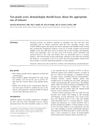 4 citations,
July 2016 in “Journal of cosmetic dermatology”
4 citations,
July 2016 in “Journal of cosmetic dermatology” Dermatologists should use hair relaxers carefully to avoid hair and scalp damage, following specific guidelines for application and maintenance.
 3 citations,
January 2018 in “İstanbul Kuzey Klinikleri”
3 citations,
January 2018 in “İstanbul Kuzey Klinikleri” Hair loss was found in 37.4% of surveyed rural high-school students in Eskisehir, Turkey, affecting their quality of life, especially in general health and mental well-being.
 12 citations,
February 2001 in “Annals of Pharmacotherapy”
12 citations,
February 2001 in “Annals of Pharmacotherapy” No effective treatment for hair loss after childbirth was found, but it usually gets better on its own and some cosmetic methods might help.
[object Object]  140 citations,
August 2011 in “Biomaterials”
140 citations,
August 2011 in “Biomaterials” Keratose, derived from human hair, is a non-toxic biomaterial good for tissue regeneration and integrates well with body tissues.
 153 citations,
January 2001 in “Science”
153 citations,
January 2001 in “Science” Using CDK inhibitors on rats showed a reduction in chemotherapy-caused hair loss, but later experiments could not repeat these results.
84 citations,
April 2015 in “Cosmetics” Hair dyes vary in how long they last and how deeply they penetrate hair.
June 2014 in “Toxicologie analytique et clinique/Annales de toxicologie analytique” Hair analysis can be unreliable due to external contamination and varying drug concentrations.
51 citations,
January 2014 in “International journal of trichology” Shampoo pH can affect hair health, with alkaline shampoos potentially causing damage and acidic shampoos reducing frizz.
 January 2025 in “Scientific Reports”
January 2025 in “Scientific Reports” Hair analysis can show changes in vitamin D levels over time.
Hair Botox makes hair look healthier and fuller.
 January 2017 in “Journal of Investigative Dermatology Symposium Proceedings”
January 2017 in “Journal of Investigative Dermatology Symposium Proceedings” The 2015 Hair Research Congress concluded that stem cells, maraviroc, and simvastatin could potentially treat Alopecia Areata, topical minoxidil, finasteride, and steroids could treat Frontal Fibrosing Alopecia, and PTGDR2 antagonists could also treat alopecia. They also found that low-level light therapy could help with hair loss, a robotic device could assist in hair extraction, and nutrition could aid hair growth. They suggested that Alopecia Areata is an inflammatory disorder, not a single disease, indicating a need for personalized treatments.
 39 citations,
January 2016 in “Journal of Cutaneous and Aesthetic Surgery”
39 citations,
January 2016 in “Journal of Cutaneous and Aesthetic Surgery” Injecting platelet-rich plasma during hair transplant surgery improves hair regrowth rate, speeds up skin recovery, and enhances hair quality.
18 citations,
April 2009 in “Journal of Chromatography A” Detecting steroid esters in cattle hair is inconsistent and influenced by sampling factors.
 9 citations,
January 2020 in “IEEE Access”
9 citations,
January 2020 in “IEEE Access” The KEBOT system is a highly accurate AI tool for analyzing hair transplants.
9 citations,
August 2020 in “Ecological indicators” Laser ablation ICP-MS is effective for tracking trace elements in polar bear hair over time.
 October 2023 in “Biomaterials”
October 2023 in “Biomaterials” Nanotechnology could improve hair regrowth but faces challenges like complexity and safety concerns.
 January 2023 in “Journal of Cosmetics, Dermatological Sciences and Applications”
January 2023 in “Journal of Cosmetics, Dermatological Sciences and Applications” The hair growth serum Trichosera® was effective in increasing hair regrowth and density and reducing hair fall without significant side effects.
[object Object]  January 2025 in “Yonsei Medical Journal”
January 2025 in “Yonsei Medical Journal” Mastic gum and peppermint extracts may promote hair growth and health.
 April 2024 in “Histochemistry and cell biology”
April 2024 in “Histochemistry and cell biology” N-acetylcysteine may prevent hair loss caused by chemotherapy.
October 2023 in “Biomimetics” The new hair-dyeing shampoo is safe, colors hair evenly, and strengthens it.

Justicia procumbens extract may help prevent hair loss and improve hair thickness and shine in a type of hair loss condition.

New treatments for hair loss should target eight main causes and use specific plant compounds and peptides for better results.
 September 2014 in “Hair transplant forum international”
September 2014 in “Hair transplant forum international” Caffeine, niacinamide, and panthenol may improve hair growth, fullness, and healing when applied to the scalp.
15 citations,
January 2012 in “International journal of trichology” The HairCheck® device is effective for measuring hair loss and growth in people with alopecia.
 3 citations,
January 2019 in “International Journal of Trichology”
3 citations,
January 2019 in “International Journal of Trichology” The balance of thiol-disulfide in women with hair loss is affected but not damaged.
 1 citations,
July 2023 in “Cureus”
1 citations,
July 2023 in “Cureus” Some treatments for hereditary hair loss are effective but vary in results and side effects; new therapies show promise but need more research.
2 citations,
May 2023 in “International Journal of Molecular Sciences” Gene expression in hair follicles can help diagnose methamphetamine use disorder.
January 2025 in “Anais Brasileiros de Dermatologia” Male pattern baldness worsens with age and can be treated with medications like minoxidil and finasteride, but side effects and personalized care are important.
5 citations,
July 2020 in “PubMed” Both oral contraceptives reduced hirsutism in PCOS patients, but adding metformin showed no extra benefit.
3 citations,
January 2021 in “Journal of dermatology & cosmetology” Current alopecia treatments manage symptoms but don't cure, and better treatments are needed.


















